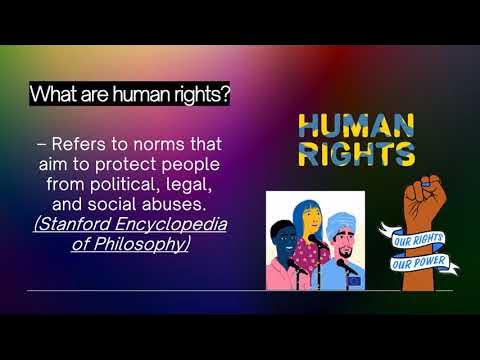CLJ2 Bill of rights sections 6-8
Summary
TLDRThis video script discusses the Bill of Rights in the Philippine Constitution, focusing on sections six, seven, and eight. Section six covers the liberty of abode and travel, with exceptions for court orders and national security. Section seven emphasizes the right to information on public matters, ensuring government transparency. Section eight highlights the freedom of association, allowing citizens to form unions and societies, except for illegal purposes, to improve workers' lives and address their concerns.
Takeaways
- 🏡 The script discusses the 'liberty of abode', emphasizing Filipinos' right to choose where they live, with exceptions for court orders or probation conditions.
- 🛫 It highlights the right to travel, which can be restricted for reasons of national security, public safety, or public health, as seen with current travel restrictions due to the coronavirus pandemic.
- 📜 Section 6 of the Bill of Rights focuses on the freedom of abode and movement, but notes that these freedoms are not absolute and can be limited by law.
- 🔍 Section 7 emphasizes the people's right to information on matters of public concern, including access to official records and government research data, subject to legal limitations.
- 🌐 The script touches on government transparency, stating that the government should provide citizens with the information they need to understand policy development and official actions.
- 🤝 Section 8 covers the right to freedom of association, allowing people to form unions, associations, or societies for lawful purposes.
- 👥 The importance of unions and associations is underscored as they serve as a voice for workers, helping address issues such as salary concerns and working conditions.
- 🚖 Examples given include teachers' unions and drivers' unions, which can advocate for fair wages and working conditions in response to economic changes.
- 🛂 The script notes that while there is freedom to join associations, this right is not absolute and can be restricted if the association's purpose is to commit rebellion against the government.
- 📝 The overall message is about balancing individual freedoms with the need for societal order and the rule of law, as outlined in the Philippine Bill of Rights.
Q & A
What does the term 'liberty of abode' refer to in the context of Section 6?
-The 'liberty of abode' in Section 6 refers to the right of Filipinos to choose where they want to live, which includes the freedom to change their place of residence.
Can the liberty of abode be restricted under certain conditions?
-Yes, the liberty of abode can be restricted under lawful orders of the court, such as in cases where a person is on probation or has been given a conditional pardon.
What is the significance of the right to travel as mentioned in Section 6?
-The right to travel in Section 6 signifies the freedom of individuals to move and travel to any place within the country or globally, subject to limitations for reasons of national security, public safety, or public health as provided by law.
How does the government justify restrictions on the right to travel?
-The government can justify restrictions on the right to travel in the interest of national security, public safety, or public health, such as during a pandemic when travel restrictions are imposed to prevent the spread of disease.
What does Section 7 of the Bill of Rights focus on?
-Section 7 focuses on the right to information, ensuring citizens have access to official records, documents, and data pertaining to official acts, transactions, or decisions, subject to legal limitations.
Why is the right to information important for citizens?
-The right to information is important as it promotes government transparency, allowing citizens to be informed about matters of public concern and hold the government accountable.
What does Section 8 of the Bill of Rights pertain to?
-Section 8 pertains to the right of the people to form unions, associations, or societies for lawful purposes, emphasizing freedom of association.
How do unions or associations improve the lives of workers?
-Unions and associations serve as a collective voice for workers, helping to address concerns such as salary issues, working conditions, and other matters affecting their welfare.
Are there any limitations to the freedom of association as stated in Section 8?
-Yes, the freedom of association in Section 8 is limited to the formation of unions, associations, or societies for purposes not contrary to the law.
What is an example of how a union can help address issues related to the cost of living?
-A union can address issues like high oil prices and fare splits for commuters by negotiating with the government or relevant authorities to establish fair pricing.
How does Section 8 ensure the rights of employees in both public and private sectors?
-Section 8 ensures the rights of employees by recognizing their freedom to form and join unions, associations, or societies, which can advocate for their interests and protect them from unfair treatment.
Outlines

This section is available to paid users only. Please upgrade to access this part.
Upgrade NowMindmap

This section is available to paid users only. Please upgrade to access this part.
Upgrade NowKeywords

This section is available to paid users only. Please upgrade to access this part.
Upgrade NowHighlights

This section is available to paid users only. Please upgrade to access this part.
Upgrade NowTranscripts

This section is available to paid users only. Please upgrade to access this part.
Upgrade Now5.0 / 5 (0 votes)





